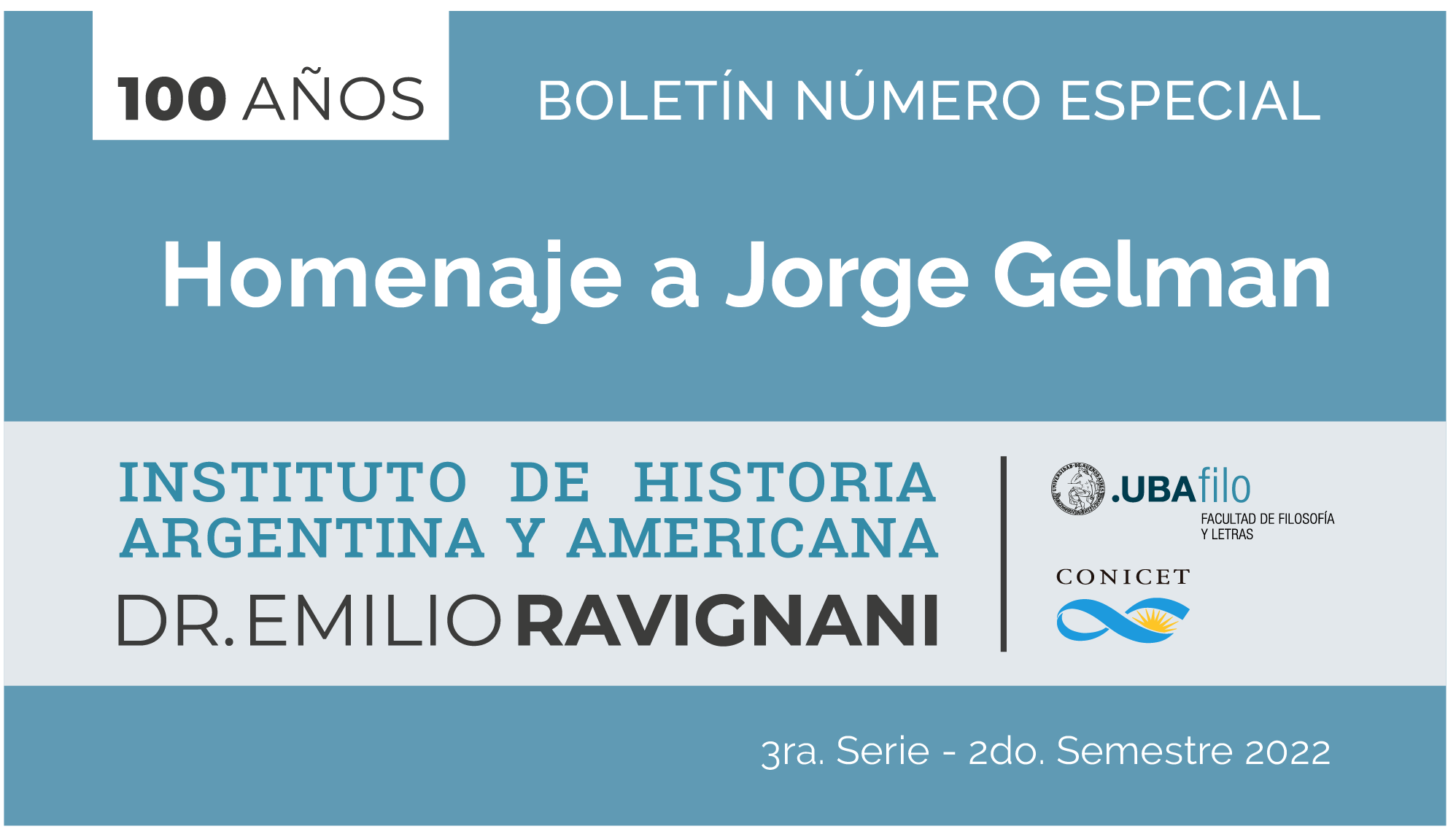The social construction of state in South America. The cross-border legacy of Jorge Gelman
Abstract
As a tribute to Jorge Gelman, this article summarizes the results of comparative research on early state formation in three South American countries: Argentina, Peru and Chile. Focusing on the hegemony-restoration efforts conducted by three “caudillo” regimes (those of Juan Manuel de Rosas, Ramón Castilla and Diego Portales), it explores cases of negotiation, inclusion and exclusion of popular actors in a dynamic it has named “social state-building”. It concludes that, starting from a common task of state-formation, the three experiences under inspection applied different strategies and doses of compulsion and seduction, resulting in equally different outcomes in terms of plebeian support and social inclusion.Downloads
References
Centeno, M. A. (2014). Sangre y deuda. Ciudades, Estado y construcción de nación en América Latina. Bogotá: Universidad Nacional de Colombia.
Contador, A. M. (1998). Los Pincheira. Un caso de bandidaje social, Chile 1817-1832. Santiago: Bravo y Allende.
Di Meglio, G. (2006). ¡Viva el bajo pueblo! La plebe urbana de Buenos Aires y la política entre la Revolución de Mayo y el rosismo. Buenos Aires: Prometeo.
Di Meglio, G. (2007). ¡Mueran los salvajes unitarios! La Mazorca y la política en tiempos de Rosas. Buenos Aires: Sudamericana.
Ferrer, A. (1999). Insurgent Cuba: Race, Nation and Revolution, 1868-1898. Chapel Hill: The University of North Carolina Press.
Fradkin, R. (2006). Historia de una montonera. Buenos Aires: Siglo XXI.
Garavaglia, J. C. (2007). Construir el Estado, inventar la nación: El Río de la Plata, siglos XVIII-XIX. Buenos Aires: Prometeo.
Gelman, J. (2009). Rosas bajo fuego. Los franceses, Lavalle y la rebelión de los estancieros. Buenos Aires: Sudamericana.
Gelman, J. y Fradkin, R. (2015). Juan Manuel de Rosas. La construcción de un liderazgo político. Buenos Aires: Edhasa.
Gelman, J. y Santilli, D. (2006). Historia del capitalismo agrario pampeano, tomo 3: De Rivadavia a Rosas. Desigualdad y crecimiento económico. Buenos Aires: Universidad de Belgrano / Siglo XXI.
Goldman, N. y Salvatore, R. (Eds.) (1998). Caudillismos rioplatenses. Nuevas miradas a un viejo problema. Buenos Aires: Eudeba.
González Bernaldo, P. (2007). Civilidad y política en los orígenes de la nación argentina. Buenos Aires: Fondo de Cultura Económica.
Guardino, P. (1996). Peasants, Politics, and the Formation of Mexico's National State: Guerrero, 1800-1857. Stanford: Stanford University Press.
Halperin Donghi, T. (1972). De la revolución de independencia a la Confederación Rosista. Buenos Aires: Paidós.
Irurozqui, M. (Ed.) (2005). La mirada esquiva. Reflexiones históricas sobre la interacción del Estado y la ciudadanía en los Andes (Bolivia, Ecuador, Perú), siglo XIX. Madrid: CSIC.
Kurtz, M. (2013). Latin American State Building in Comparative Perspective. Social Foundations of Institutional Order. Cambridge: Cambridge University Press.
Lange, M. (2013). Comparative-Historical Methods. Los Angeles y Londres: Sage Publications.
Lanteri, S. (2011). Un vecindario federal. La construcción del orden rosista en la frontera sur de Buenos Aires (Azul y Tapalqué). Córdoba: Centro de Estudios Históricos C. Segreti.
Larson, B. (2004). Trials of Nation Making: Liberalism, Race and Ethnicity in the Andes, 1810-1910. Cambridge: Cambridge University Press.
López-Alves, F. (2000). State Formation and Democracy in Latin America, 1810-1900. Durham: Duke University Press.
Mahoney, J. y Rueschemeyer, D. (Eds.) (2003). Comparative Historical Analysis in the Social Sciences. Cambridge: Cambridge University Press.
Mallon, F. (1997). Peasant and Nation. The Making of Postcolonial Mexico and Peru. Berkeley y Los Angeles: University of California Press.
Méndez, C. (2005). The Plebeian Republic. The Huanta Rebellion and the Making of the Peruvian State, 1820-1850. Durham: Duke University Press.
Myers, J. (1995). Orden y virtud. El discurso republicano en el régimen rosista. Buenos Aires: Universidad Nacional de Quilmes.
Portantiero, J. C. y De Ípola, E. (1981). Lo nacional-popular y los populismos realmente existentes. Nueva Sociedad, 54.
Reid Andrews, G. (1980). The Afro-Argentines of Buenos Aires. Madison, University of Wisconsin Press.
Reis, J. J. (1993). Slave Rebellion in Brazil; The Muslim Uprising of 1835 in Bahia. Baltimore: Johns Hopkins University Press.
Rojas, M. (2008). Las voces de la justicia. Delito y sociedad en Concepción (1820-1875). Atentados sexuales, pendencias, bigamia, amancebamiento e injurias. Santiago: DIBAM.
Sabato, H. (2018). Republics of the New World. The Revolutionary Political Experiment in 19th-Century Latin America. Princeton: Princeton University Press.
Salazar, G. (2005). Construcción de Estado en Chile, (1800-1837). Santiago: Sudamericana.
Salvatore, R. (2003). Wandering Paysanos: State Order and Subaltern Experience in Buenos Aires during the Rosas Era. Durham: Duke University Press.
Sanders, J. (2004). Contentious Republicans: Popular Politics, Race, and Class in Nineteenth-Century Colombia. Durham: Duke University Press.
Soifer, H. D. (2015). StateBuilding in Latin America. Cambridge: Cambridge University Press.
Ternavasio, M. (2002). La revolución del voto. Política y elecciones en Buenos Aires, 1810-1852. Buenos Aires: Siglo XXI.
Thompson, E. P. (1978). Eighteenth-Century English Society: Class Struggle without Class? Social History, 3(2).
Thurner, M. (1997). From Two Republics to One Divided. Contradictions of Postcolonial Nationmaking in Andean Peru. Durham: Duke University Press.
Walker, Ch. (1999). Smoldering Ashes. Cuzco and the Creation of Republican Peru, 1780-1840. Durham: Duke University Press.
Weinstein, B. (2012). “Notícias da academia norte-americana: A historiografia da América Latina e o viés transnacional”, conferencia leída en el X Encuentro Internacional de la ANPHLAC, São Paulo, Brasil, 24 al 27 de julio.
Weinstein, B. (2013). Pensando la historia más allá de la nación: la historiografía de América Latina y la perspectiva transnacional. Aletheia, 3(6).
Copyright (c) 2022 Boletín del Instituto de Historia Argentina y Americana Dr. Emilio Ravignani

This work is licensed under a Creative Commons Attribution-NonCommercial 4.0 International License.
The copyright is transferred to the Boletín, but the authors may retrieve them and reproduce their work in other media or formats by means of a written request to the Editorial Committee. In such cases, the Boletín will be cited as the first publication of the work.
The works are licensed under a Creative Commons Attribution-NonCommercial 4.0 International License, which allows others to share the work with an acknowledgment of their authorship and initial publication in this journal.
Also, by written request to the Editorial Committee of the Boletín, the authors may separately establish additional agreements for the non-exclusive distribution of the version of the work published in this journal (for example, placing it in an institutional repository or publishing it in a book), with an acknowledgement of its initial publication here. No commercial uses are allowed.



















